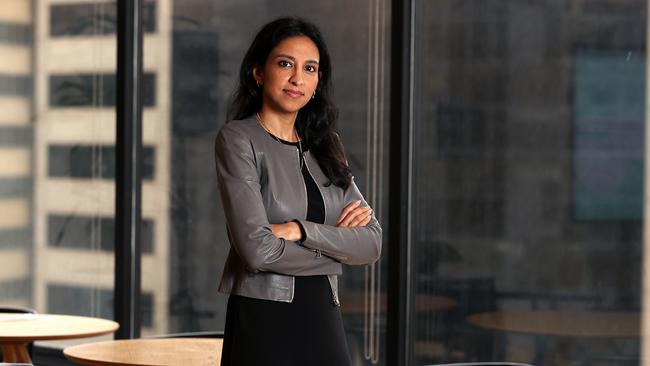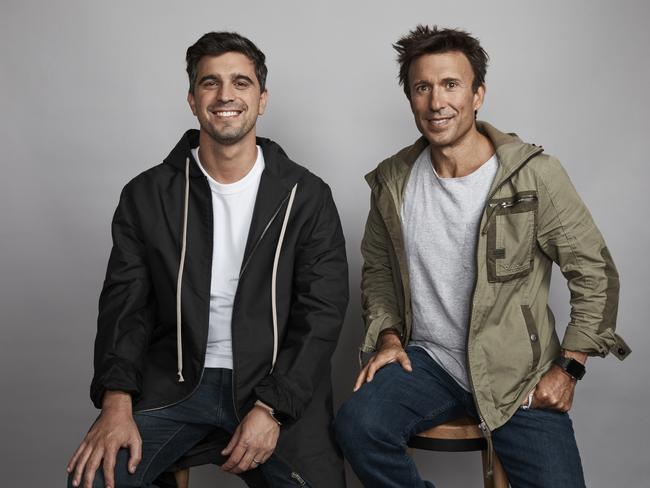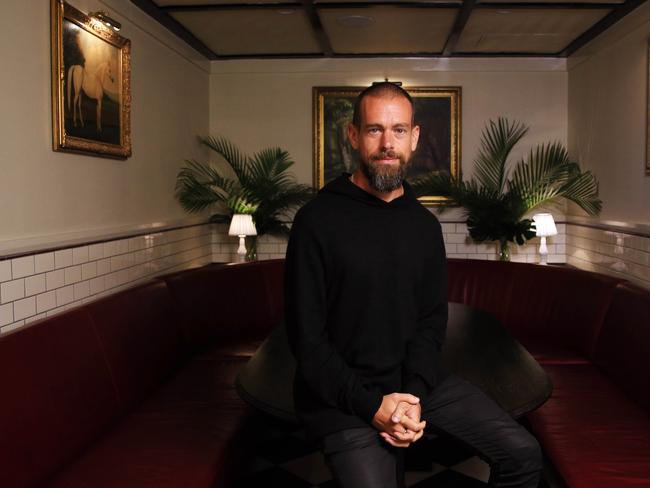We’re in this for the long haul, says Afterpay owner Block
One year on from the largest acquisition in Australian corporate history, Block executive Amrita Ahuja says buying Afterpay is as attractive as it was 12 months ago.

One year on from pulling off the most valuable takeover in Australian corporate history – the $39bn buyout of Afterpay – one of Block’s top executives said she wouldn’t change a thing about the deal, despite a reckoning for the buy now, pay later industry.
Digital payment players have been torn down from dizzying highs reached during the pandemic and the sector is braced for more failures and consolidation amid rising interest rates and tightened venture capital funding.
Proposed new regulations loom for a sector that has been often criticised for taking advantage of those who can least afford its services.
But Block’s global chief financial and operating officer, Amrita Ahuja, who was a key architect of the deal, said the right way to view Block’s mammoth Afterpay bet was with a five to 10-year horizon, rather than anything short term.
“What we’ve seen is some normalisation of the core buy now, pay later product coming out of the pandemic,” Ms Ahuja said during her first trip to Australia where she will hold meetings with the Tech Council of Australia and Fintech Australia.
While conceding BNPL valuations have come back down to earth, she argues Afterpay is still a significant value-add for what Block is trying to build.
Afterpay contributed $US811m ($1.22bn) and $US588m of gross profit to Block through the 2022 calendar year.
“Afterpay has the potential to be a transformative opportunity, for us to unite the seller and consumer sides of our ecosystem, and it has the potential to reach tens of millions of digital native customers … It’s a very attractive proposition for an enterprise merchant looking for e-commerce opportunities.
“It’s a multi-year journey we’re on with Afterpay that we’re still in the very early days of, and we’re just as excited about it today as we have been in the past.”
The Block executive declined to be drawn on the unfolding banks saga sweeping the US financial services sector following the collapse of Silicon Valley Bank, but said it was not materially impacted by SVB’s demise.
Since the 2022 acquisition, Block has been busy working Afterpay functionality into its flagship Cash App, including a “discover” tab which customers can use to browse retailers – although Block chief executive Jack Dorsey has said the integration is still in its early days.
The fintech company didn’t just nab Afterpay’s revenues, customer base, branding and assets in the mega deal, it also acquired the company’s co-founders, Nick Molnar and Anthony Eisen, who for the past five years have been venerated as strong examples of Australian entrepreneurial success.

Mr Molnar and Mr Eisen are still with Block and are both currently serving as Afterpay co-leads within the broader Block business, working closely with Mr Dorsey.
“They’re both incredibly entrepreneurial leaders who have a wonderful sensibility as people managers and leaders across the company. I couldn’t be more excited to be working with them honestly,” Ms Ahuja said of her Australian colleagues.
Block, which was formerly named Square, also acquired embattled music streaming service Tidal for $US302m in 2021 in a deal that raised eyebrows among industry observers. It will now no longer need acquisitions to grow its business, the executive said.
The payments giant is now looking to expand its Cash App to new markets including Australia, an effort being led by former NAB and Suncorp executive Lee Hatton, who served most recently as Afterpay’s executive vice president.
Australia is Block’s largest market outside of the US, according to Ms Ahuja, and the company has more than 1200 staff across Sydney and Melbourne, making it a natural fit for Cash App.
Melbourne was Block’s first engineering hub outside of America and Mr Dorsey has previously lauded the city’s engineering talents.
Currently only available in the US and the UK, Cash App is a rival to PayPal that allows users to transfer money to one another immediately for a flat 1.5 per cent fee.
Ms Ahuja said despite the relative dominance of Australia’s big four banks, Block’s local talent along with the company’s design principles and its modern cloud-based infrastructure would help differentiate Cash App from rivals when it is eventually launched here. She did not disclose a timeline for the app’s local launch.

“One thing that’s unique about Cash App is that we can leverage the social graph, it’s a peer-to-peer money transmission app. That’s a core value proposition,” she said.
“Today you can send money not only using flat currency but also bitcoin, or stocks or a gift card when you’re interacting with a friend or another business with Cash App.
“We can do things with our products that are unique given all of these different elements that we’ve got within the Cash App.”
As well as new product launches the company is preparing for potential new buy now, pay later regulations globally, including in Australia.
The federal government is currently consulting on BNPL regulations, and some consumer groups want Afterpay and other BNPL players to be treated like traditional credit products. Afterpay already conducts credit checks in the US and has flagged that it may be open to doing so for certain customers in Australia. The company has called for a mandatory BNPL code of practice for all providers.
“It’s a huge focus for us to engage with regulators to educate and ensure that regulations are about truly protecting consumers,” Ms Ahuja said.
“We believe that our policies are responsible and are about not enabling consumers to get into a negative debt spiral.
“And we want regulations to ultimately level the playing field to ensure that all actors in the industry are doing so in the same way.”



To join the conversation, please log in. Don't have an account? Register
Join the conversation, you are commenting as Logout